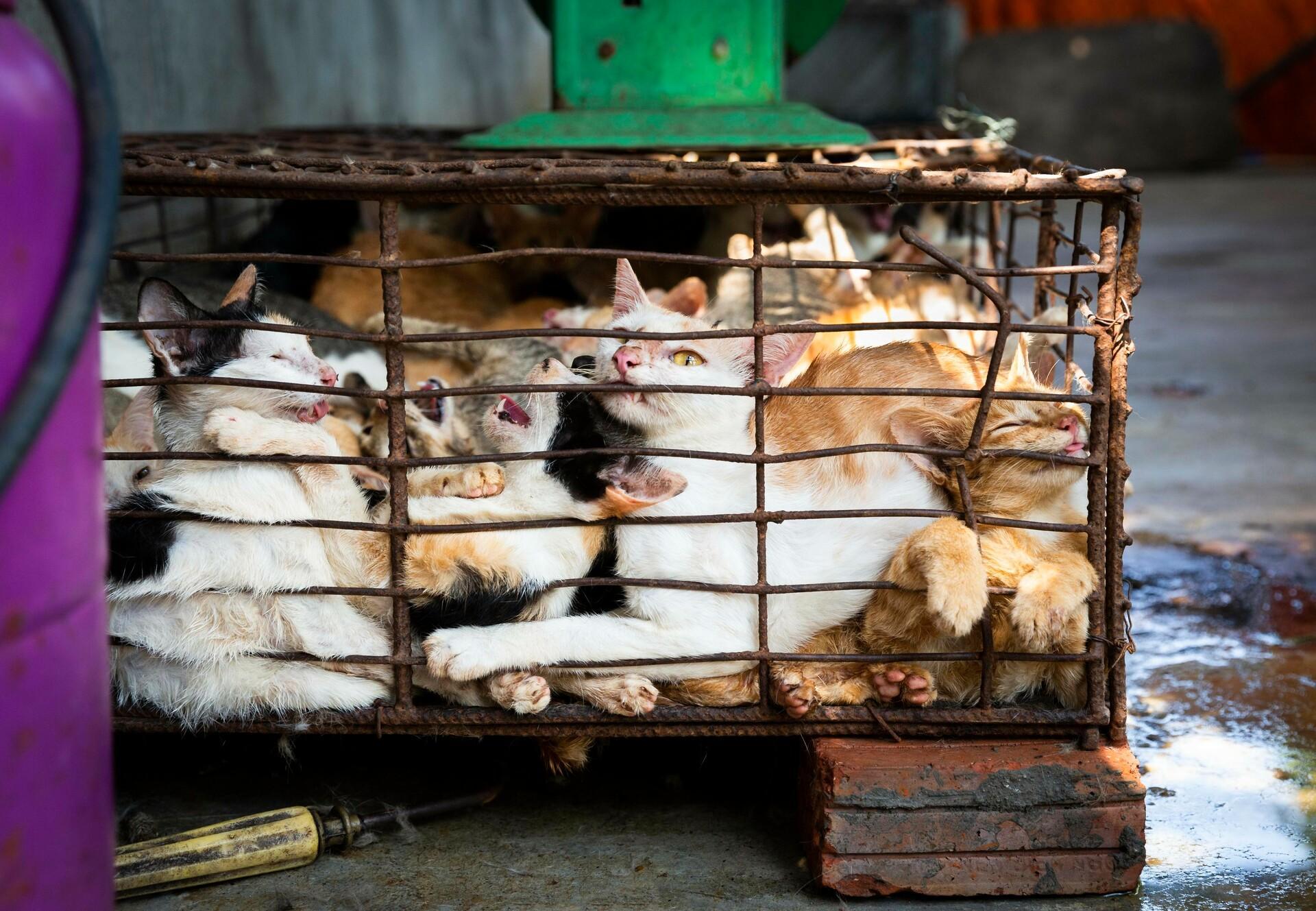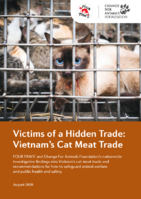
Special dish 'Little Tiger': The rampant cat meat trade in Vietnam
According to FOUR PAWS and Change For Animals Foundation, over one million cats are killed for their meat every year, part of a nationwide cruel and hidden trade
12 August 2020 – While the trade and consumption of dog meat in Asia is increasingly being discussed in public, the equally brutal cat meat trade is still relatively unknown. Global animal welfare organisations FOUR PAWS and Change For Animals Foundation have now released the findings of their nationwide investigations into the country’s illicit cat meat trade, exposing the true extent of the hidden trade: In Vietnam alone, an estimated one million cats every year – including strays and pets – are stolen from the streets and even from people’s homes, trafficked across the country and brutally slaughtered. Locally known as 'Little Tiger', whilst once centered in Northern provinces, the dish is spreading in popularity nationwide despite increasing pet ownership. The trade is not only a threat to animal welfare but also to human health with the risk of rabies and zoonotic diseases. FOUR PAWS and Change For Animals Foundation therefore calls on the Vietnamese government to reinstate laws previously in place that explicitly prohibited the cat meat trade, and enforce and strengthen existing laws to safeguard human and animal health and protect people’s pets from being stolen.
In contrast to the local dog meat trade, the hunting, slaughtering and consumption of cats was explicitly illegal in Vietnam until January 2020. However, the law has been revoked and cat meat is in more demand than ever – particularly in the north of the country, but with its popularity is spreading to other parts of the country as far south as Ho Chi Minh City. The investigations by FOUR PAWS and Change For Animals Foundation identified Hanoi and the Thai Binh province as Vietnam's cat meat hotspots, with their large networks of hundreds of restaurants, holding areas and slaughterhouses. To meet the increasing demand, free roaming stray and pet cats are captured and sold alive to wholesalers or directly to restaurants for slaughtering. According to the organisations, there are no farms in Vietnam where cats are bred specifically for the meat trade.
Some restaurants purchase the animals directly from cat thieves and slaughter them themselves on their premises, but most operate with wholesalers and slaughterhouses. According to the investigations, the coastal towns of Da Nang and Hoi An in central Vietnam – popular amongst national and international tourists – are considered crucial for the sourcing and distribution of stolen cats. “In holding areas, the wholesalers keep the cats crammed into small cages for several days until they have collected enough animals to cover the costs of transport. Over hundreds of kilometres the cats are transported without water, food and sufficient ventilation to the slaughterhouses scattered throughout Vietnam. Some wholesalers even use luggage compartments on regular passenger buses for the trafficking,” says Lola Webber, Co-Founder and Programs Director of Change For Animals Foundation. In the slaughterhouses, the cats are usually drowned, provided they have not died from exhaustion, heat stroke or injuries caused by their brutal capture and transportation. FOUR PAWS and Change For Animals Foundation have also documented that cats are sometimes bludgeoned to death with a hammer, boiled alive or killed by electrocution. The fur is then stripped from the animals and the skin is burned. Only after that the cats are gutted and frozen for further transport.
Black cats seen as premium meat
The cat meat trade is a profitable business. A live cat is sold for around 6.50 US dollars (5.70 euros) per kilo, one kilo of their meat costs 8.50 US dollars (7.50 euros). Restaurants offer dishes prepared with cat meat for about 6.50 US dollars (5.70 euros). According to the latest research by FOUR PAWS and Change For Animals Foundation, black cats are worth even more. Traders sell them alive for 8.50 US dollars (7.50 euros) per kilo, their raw meat fetches up to 21.50 US dollars (18.90 euros) per kilo. Younger generations consider cat meat an exotic delicacy. For older people, consumption is usually linked to customs, superstition, and the lunar calendar. Some locals are convinced that eating cat meat repels bad luck. Others eat the meat – especially from black cats – because they believe it has healing effects, although there is no scientific evidence for this.
Danger to public safety and public health
In recent years, cats have become popular pets in Vietnam – despite the increasing demand for their meat, which can no longer be met with capturing stray cats alone. Hence, cat thieves do not shy away from stealing pets. Violent clashes between cat thieves and pet owners have occurred frequently, some of which have also been known to end fatally. According to FOUR PAWS and Change For Animals Foundation, the practices used in the cat meat trade could also potentially lead to the outbreak of zoonotic diseases in the future as seen with COVID-19, due to unsanitary conditions, brutal and unhygienic treatment of animals, multi-species transport, holding and slaughtering facilities, and cross border transportation and handling. Without any controls, many of the animals – whether healthy or sick – are transported across the entire country. The unsanitary conditions in holding areas and slaughterhouse facilities, often holding various species from numerous sources, facilitate the transmission of zoonotic disease and provides the perfect breeding ground for the development of novel ones, with potentially catastrophic results.
Read our report here:
FOUR PAWS’ fight against the cat and dog meat trade
In Vietnam, FOUR PAWS partners with Change For Animals Foundation, as well as local NGO’s Vietnam Cat Welfare in Hoi An and Paws for Compassion in Da Nang to improve companion animal welfare. To put a sustainable end to the brutal cat and dog meat trade in Southeast Asia, FOUR PAWS has launched a campaign on an international and national level in Vietnam, Cambodia, and Indonesia. “Through educational work and cooperation with the responsible authorities, local communities and the tourism industry, FOUR PAWS’ is calling upon Governments in Southeast Asia to introduce, strengthen and enforce animal protection laws, which will bring an end to the capture, slaughter and consumption of dogs and cats. This will not only protect animals – but also people as well from public health risks,” says Dr Karanvir Kukreja, Project Manager for FOUR PAWS’ Ending the Dog and Cat Meat Trade Campaign. Furthermore, FOUR PAWS supports local animal welfare organisations and communities with humane and sustainable stray animal care programmes. FOUR PAWS is also part of the animal welfare coalitions DMFI (Dog Meat Free Indonesia) and ACPA (Asia Canine Protection Alliance), which lobby against the trade in Southeast Asia, as well as the Asia for Animals Coalition, which works to improve the welfare of animals across the region.
The support for an end to this cruel trade has gained global traction with FOUR PAWS petition receiving over 840,000 signatures since it launched late last year: https://help.four-paws.org/en/end-dog-and-cat-meat-trade-southeast-asia
Get more information about our campaign to end the Dog and Cat Meat Trade in Southeast Asia!

Elise Burgess
Head of CommunicationsM: 0423 873 382
FOUR PAWS Australia
GPO Box 2845
SYDNEY NSW 2001
Main Phone: 1800 454 228
Follow us on social media
Stay up to date on this topic and on all FOUR PAWS activities on our social media channels:
About FOUR PAWS
FOUR PAWS is the global animal welfare organisation for animals under direct human influence, which reveals suffering, rescues animals in need and protects them.
Founded in 1988 in Vienna by Heli Dungler and friends, the organisation advocates for a world where humans treat animals with respect, empathy and understanding. The sustainable campaigns and projects of FOUR PAWS focus on companion animals including stray dogs and cats, animals in fashion, farm animals, and wild animals – such as bears, big cats, and orangutans – kept in inappropriate conditions as well as in disaster and conflict zones.
With offices in Australia, Austria, Belgium, Bulgaria, France, Germany, Kosovo, the Netherlands, Switzerland, South Africa, Thailand, Ukraine, the UK, the USA, and Vietnam as well as sanctuaries for rescued animals in eleven countries, FOUR PAWS provides rapid help and long-term solutions. www.four-paws.org.au

